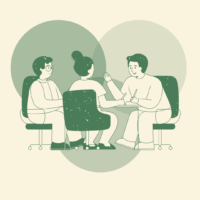Growing up in a traditional Mexican household, I was raised hearing the phrases “You feel like this because you are in the house all day” or “That’s not real, stop pretending to be sick” when I would communicate my feelings to my family. Just like in my household, there are thousands of other traditional families that refuse even the mention of mental illnesses such as anxiety and depression. Mental health and mental illnesses are treated as some kind of taboo, especially among older generations. This generation, however, is conscious about the importance of mental health, it is now recognized that maintaining good mental health is a basic necessity and many know the consequences that ignoring mental health issues brings to one’s life. However, even though new generations are now advocating for better mental health education and recognition, there is still a taboo surrounding mental health among traditional homes. Traditional ethnic families are tightly run by traditions and knowledge passed down through generations. This means that the change needs to happen in older generations that believe mental health is “fake” or something they can ignore.
Nevertheless, there is hope for future generations. More and more people are getting educated about the importance of mental health and with that, the hope that they can teach older generations and future generations about mental health are alive. That and the constant fight to advocate for mental health will make the stigma around therapy and mental health illnesses among traditional families banish.






